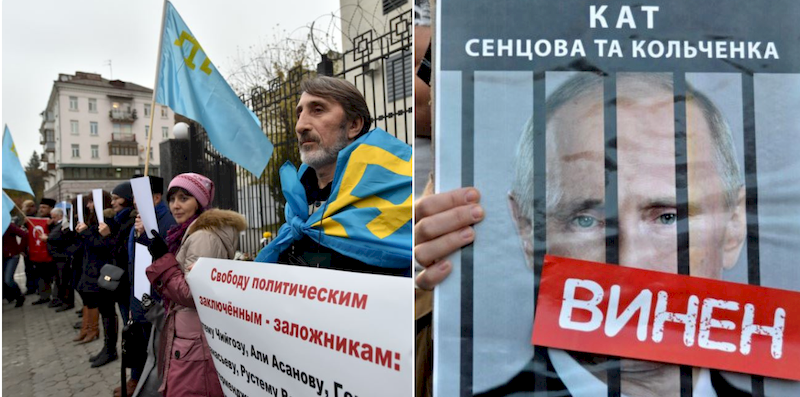• Topics / Human Rights Abuses in Russian-occupied Crimea
Russia steps up fight against Crimean Tatars, not terrorism before the World Cup

Any football fans believing that Russia’s security service are working to ensure their safety from terrorist attacks around the World Cup should think again. There are much easier ways for Russia’s FSB to enhance their ‘anti-terrorism’ statistics, while also demonstrating loyalty to the Kremlin and thus improving their chances of promotion.
Nowhere are these tasks more obviously combined than in occupied Crimea. Russia began its use of anti-terrorism legislation within two months of annexation with the FSB’s arrests of Ukrainian filmmaker Oleg Sentsov and three other opponents of Russian occupation. Propaganda in the state-controlled media was aimed at demonstrating what kind of ‘terrorist threat’ Russia had protected Crimeans from. The sentences against Sentsov and civic activist Oleksandr Kolchenko (20 and 10 years, respectively) were so harsh precisely because the two men refused to ‘confess’ to a non-existent terrorist plot under torture.
Fabrication of ‘terrorism’ or ‘sabotage’ charges has continued, with the FSB using torture, threats and other forms of pressure to extract ‘confessions’ and prevent the men arrested from seeing lawyers. In those cases also, it is the men who hold out and refuse to agree to admit ‘guilty’ who face the harshest sentences.
Nikolai Polozov, a Russian lawyer who defended Crimean Tatar political prisoner Akhtem Chiygoz and others, notes drily that it is only since Russia’s annexation of Crimea that “every second Crimean has turned out to be a terrorist”.
In fact, the systemic repressive measures used against Crimean Tatars have nothing in common with fighting terrorism. Russia is rather punishing Crimean Tatars and the Crimean Tatar Mejlis for their opposition to Russian occupation of Crimea which has spoiled Russia’s narrative on the supposed overwhelming support for what it calls “the will of the Crimean people to join Russia”.
This is not all, he says, since “Russia is getting ready for the World Cup and as part of this preparation, there is a sharp increase in so-called anti-terrorism activities. The relevant state body [i.e. the FSB] needs to demonstrate some kind of result, and evidently the FSB has decided in Crimea to show off its achievements in this manner”.
One of the most cynical methods for imitating success in ‘fighting terrorism’ is to arrest some more Crimean Muslims on spurious charges of belonging to Hizb ut-Tahrir, a peaceful pan-Islamist movement which is legal in Ukraine and which is not known to have committed or called for acts of terrorism anywhere in the world. These conveyor belt prosecutions carry sentences of up to life imprisonment, with the only ‘proof’ required being of alleged membership of Hizb ut-Tahrir and that can be achieved by a totally ‘secret witness’ prepared to claim to have been ‘recruited’ by the arrested men. The FSB has increasingly used such arrests to target human rights and civic activists, in particular Crimea Solidarity, the civic initiative formed to help political prisoners and their families.
Polozov was speaking shortly after the armed searches and arrests on ‘Hizb ut-Tahrir charges’ of one of the founders of Crimea Solidarity Server Mustafaev and another Crimean Tatar activist, Edem Smailov. Those arrests on 21 March were timed to coincide with the FSB claim that it had ‘uncovered an extremist group’ supposedly created by the Head of the Mejlis Refat Chubarov, and an aide to veteran Crimean Tatar leader Mustafa Dzhemilev.
There is another motive behind Russia’s attempts to link the Mejlis with ‘extremism’. Its ban of this self-governing body of the main indigenous people of Crimea on April 26, 2016 which was upheld by the Russian Supreme Court on Sep 29, 2016, was internationally condemned and has been challenged in the European Court of Human Rights. It also forms part of Ukraine’s suit against Russia before the UN’s International Court of Justice at the Hague over violation of the UN Convention against Discrimination. The Court on April 19, 2017, agreed to Ukraine’s request for provisional measures, and ordered Russia to withdraw its ban on the Mejlis.
In the middle of May 2018, Ukraine approached the Court over the fact that Russia is still failing to comply with that order.
The nonsensical ‘extremist group plot’ supposedly uncovered in May 2018 is the second such FSB attempt to discredit the Mejlis and its leaders, as well as other respected members of the Crimean Tatar community (see also:
As Polozov puts it, Russia is, instead of complying with the International Court of Justice order, “looking for arguments to claim that they can’t allow the Mejlis, look what they’re up to”.
The Mejlis and Crimean Tatar national movement in general were always peaceful, and veteran Crimean Tatar leader Mustafa Dzhemilev has enjoyed respect in the world for decades over his unwavering commitment to non-violent forms of protest.
This does not suit the Kremlin, and, as Polozov puts it, “the Russian authorities are trying to foist some kind of ‘extremist’ or ‘terrorist’ labels on them. This is an attempt to influence public opinion, to influence the attitude of the population to Crimean Tatars. The current situation in Crimea has nothing to do with fighting terrorism”
Neither do the huge sentences passed on Oleg Sentsov, Oleksandr Kolchenko, Ruslan Zeytullaev and many other Crimeans. Oleg Sentsov has been on hunger strike since 14 May and has vowed to continue to the end if his one demand is not met – the release of all Russia’s Ukrainian political prisoners.
The World Cup 2018 must not be a propaganda exercise for Russian President Vladimir Putin and chance for the FSB to get good statistics and promotion by imprisoning innocent men.





